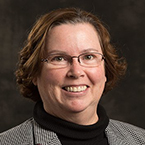
Scientific Areas of Expertise: Apoptosis; Autophagy; Cancer Metabolism
For key contributions to the understanding of oncogenic activation and the role of apoptotic inhibition in promoting cancer and treatment resistance, for discovering BCL-2 oncogene homologues, and for defining the role of autophagy in promoting cellular homeostasis and facilitating cancer metabolism and tumorigenesis.
A prominent authority in cancer metabolism, Dr. White is renowned for her key contributions to the understanding of oncogenic activation and the role of apoptotic inhibition in promoting cancer and treatment resistance. Dr. White’s group was the first to demonstrate that tumor cells activate the cellular self-cannibalization process of autophagy as a stress survival mechanism and that inhibition of autophagy may comprise a novel approach to improve solid tumor therapy. Early in her career, Dr. White discovered a viral oncogene capable of inhibiting apoptosis and identified it as a homologue of the human BCL-2 oncogene. From this work, she established the importance of BCL-2 in the deregulation of cell growth and the activation of apoptosis, elucidating that apoptosis inhibition could promote tumor growth and resistance to anti-cancer therapy. These findings paved the way toward understanding the role of p53 as a tumor suppressor through its ability to activate apoptosis, and the importance of anti-apoptotic proteins such as Bcl-2 to the promotion of tumorigenesis.
More recently, Dr. White’s work has been dedicated to identifying mechanisms required for tumor cells to survive, proliferate, and evade immunosurveillance with a translational focus on modulating apoptotic pathways for cancer therapy. Her pivotal studies involving autophagy have revealed that under conditions of nutrient depravation, cancer cells achieve survival by upregulating intracellular nutrient scavenging to recycle macromolecules into metabolic pathways. She has also elegantly shown that cancer cell autophagy can sustain essential levels of the amino acid arginine required for growth. Moreover, by examining the interplay between autophagy and the immune response, her group has revealed that autophagy suppresses inflammation and inhibits anti-tumor T-cell responses resulting in tumor growth. Additionally, in conjunction with collaborators, Dr. White has demonstrated that in Ras-driven lung cancer models, autophagy is required for progression to aggressive carcinoma and that autophagy inhibition suppresses lung tumor growth. Autophagy blockage is now being investigated in various clinical trials as a novel therapeutic modality.
Selected Awards and Honors
2021 Elected Member, National Academy of Sciences, Washington, DC
2011 Elected Fellow, American Association for the Advancement of Science, Washington, DC
2010 Career Award, European Cell Death Organization, Ghent, Belgium
2010 Achievement Award Lectureship, International Cell Death Society, Flushing, New York
2007-2010 Board of Directors, American Association for Cancer Research, Philadelphia, Pennsylvania
2009 Scientific Review Board, Cancer Prevention and Research Institute of Texas, Austin, Texas
2007 Scientific Review Board, Starr Cancer Consortium, The Starr Foundation, New York, New York
2007 Elected Fellow, American Society of Microbiology, Washington, DC
2006 MERIT Award, National Cancer Institute, National Institutes of Health, Bethesda, Maryland
2006 Mentoring Award, New Jersey Association for Biomedical Research, Atco, New Jersey
2000-2005 Board of Scientific Counselors, National Cancer Institute, National Institutes of Health, Bethesda, Maryland
1998-2005 Investigator, Howard Hughes Medical Institute, Chevy Chase, Maryland
1983 Red Smith Award, Damon Runyon Cancer Research Foundation, New York, New York